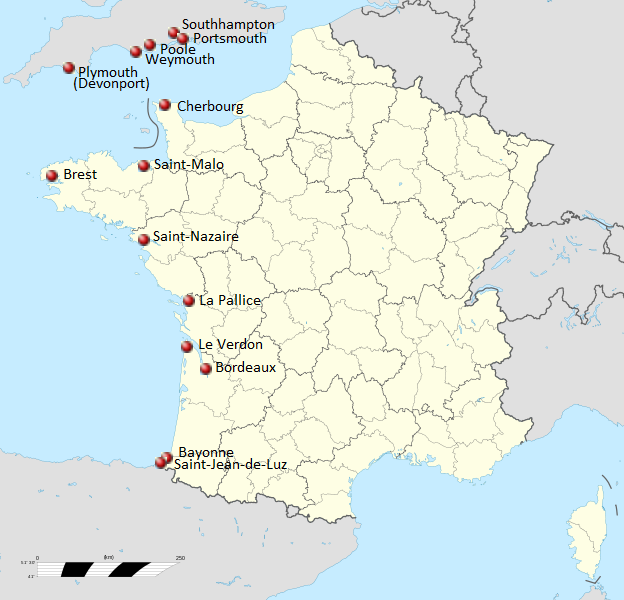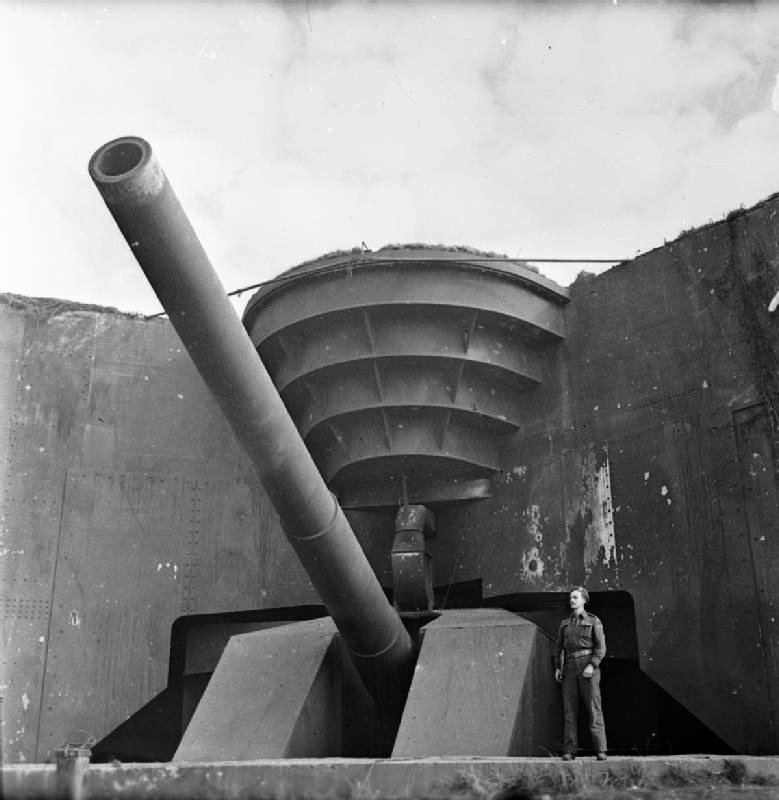1.
The only other proper thread on this I could find is this one from 8 years ago, and it mainly deals with a PoD that's way before the British bugged out of France.
2. some background before we get started:

 en.wikipedia.org
en.wikipedia.org

 en.wikipedia.org
en.wikipedia.org
 en.wikipedia.org
en.wikipedia.org
 en.wikipedia.org
en.wikipedia.org

 en.wikipedia.org
en.wikipedia.org
 en.wikipedia.org
en.wikipedia.org
3. reasons for the actual PoD
Churchill decides ITTL to defend the Channel Islands by pulling back a part of the "2nd BEF" towards them, in order to accomplish two goals:
i. force the Germans to delay any operations against Britain by first concentrating against the Channel Islands. Moreover, should the Germans do this, they would be vulnerable to having the Luftwaffe bloodied by having flak concentrated in on specific spot, or having the Kriegsmarine suffer potentially even more losses in light vessels, which they were lacking so much. Thus, even if they were to fall and all men stationed there lost, they would still fulfill their purpose by sufficiently delaying the Germans and causing them losses they could ill afford.
ii. assuming the Germans decide to ignore the islands instead and go full-steam for Sealion, it opens up the supply routes of any potential landings in the center or western part of the front to attacks by British light craft stationed in the Channel Islands, thus allowing a lighter defense of that area and focusing of the limited ground forces available on the eastern part.

(while we know today that Sealion was pretty much doomed to failure, things were not so clear cut in the chaotic days of the collapse of the front in France)
Note: this is NOT a thread about "Britain/Germany could have done better if it did this or that", which usually brings out the Negative Nancys hell-bent on shitting on an idea. Rather, this would be about exploring the effects of a different decision, with good and bad effects for both.
4. What happened OTL
OTL, on the night of June 14th, after efforts to stop the Germans from crossing the Seine had failed, the British decided to pull back from France, although they still dithered on the 15th on exactly WHEN to do so.
Eventually, the following formations were pulled back from the immediate vicinity of the Channel Islands:
Cherbourg (30,630 men):
3rd Armoured Brigade of the 1st Armoured Division
157th (Highland Light Infantry) Brigade
71st Field Regiment R.A. and the Troop Carrying Company of the 52nd (Lowland) Infantry Division
Beauman Division (formerly Line of Communication troops)
Saint Malo (21,474 men)
1st Canadian Division
As artillery, the following was evacuated 120 guns of the 52nd (Lowland) Division from Cherbourg, 24 of the 1st Canadian Division from Brest and 32 guns of the Beauman Division from Cherbourg.
5. How this will take place ITTL
A lot of the small ships that participated in Operations Dynamo and Cycle are sent to Cherbourg and Saint Malo. There, they pick up a lot of the infantry of the above formation (except for the 3rd Armoured Brigade and 1st Canadian Division, which head straight for England) and ferry them to Jersey and Guernsey. This allows the regular transports to focus on picking up more of the equipment that was lost OTL. Some of the guns are also sent to the Islands instead of Plymouth. The Beauman Division was disbanded following its evacuation, so keeping it together here isn't much of a loss for Britain.
Later on, some of the Polish forces evacuated from France, which were never utilized during the war, are also sent to reinforce the Channel Islands, on the same view that they would be more or less expendable.
Polish Independent Highland Brigade - 3000 men
Polish 4th Infantry Division - 3500 men
During and after all of this, all civilians on the Channel Islands not essential to the war effort are evacuated, in order to have less mouths to feed.
Thus, by the time the Germans had France secured by late June, you have around 32.000 men, at most, defending the Channel Islands.
6. German response
OTL, the Germans planned to invade the islands mostly for propaganda purposes, preparing 2 battalions for this:

 en.wikipedia.org
ITTL, the flurry of activity surrounding them would probably make them reconsider sending only such a small force.
en.wikipedia.org
ITTL, the flurry of activity surrounding them would probably make them reconsider sending only such a small force.
To what extent would this forward British outpost make Hitler alter his plans? Could we see a divisional-sized landing effort preceded by an intensive bombing campaign undertaken at the expense of operations over the Channel or over Britain (Kanalkampf, Adlertag etc.). Would such efforts be successful, or could the British counter them by, say, sending out a force of expendable destroyers and other light craft as soon as the invasion starts?
The only other proper thread on this I could find is this one from 8 years ago, and it mainly deals with a PoD that's way before the British bugged out of France.
2. some background before we get started:

Operation Aerial - Wikipedia

Beauman Division - Wikipedia
Norman Force - Wikipedia
Evacuation of the Polish Army from Saint-Jean-de-Luz - Wikipedia

Polish Armed Forces in the West - Wikipedia
4th Infantry Division (Poland) - Wikipedia
3. reasons for the actual PoD
Churchill decides ITTL to defend the Channel Islands by pulling back a part of the "2nd BEF" towards them, in order to accomplish two goals:
i. force the Germans to delay any operations against Britain by first concentrating against the Channel Islands. Moreover, should the Germans do this, they would be vulnerable to having the Luftwaffe bloodied by having flak concentrated in on specific spot, or having the Kriegsmarine suffer potentially even more losses in light vessels, which they were lacking so much. Thus, even if they were to fall and all men stationed there lost, they would still fulfill their purpose by sufficiently delaying the Germans and causing them losses they could ill afford.
ii. assuming the Germans decide to ignore the islands instead and go full-steam for Sealion, it opens up the supply routes of any potential landings in the center or western part of the front to attacks by British light craft stationed in the Channel Islands, thus allowing a lighter defense of that area and focusing of the limited ground forces available on the eastern part.
(while we know today that Sealion was pretty much doomed to failure, things were not so clear cut in the chaotic days of the collapse of the front in France)
Note: this is NOT a thread about "Britain/Germany could have done better if it did this or that", which usually brings out the Negative Nancys hell-bent on shitting on an idea. Rather, this would be about exploring the effects of a different decision, with good and bad effects for both.
4. What happened OTL
OTL, on the night of June 14th, after efforts to stop the Germans from crossing the Seine had failed, the British decided to pull back from France, although they still dithered on the 15th on exactly WHEN to do so.
Eventually, the following formations were pulled back from the immediate vicinity of the Channel Islands:
Cherbourg (30,630 men):
3rd Armoured Brigade of the 1st Armoured Division
157th (Highland Light Infantry) Brigade
71st Field Regiment R.A. and the Troop Carrying Company of the 52nd (Lowland) Infantry Division
Beauman Division (formerly Line of Communication troops)
Saint Malo (21,474 men)
1st Canadian Division
As artillery, the following was evacuated 120 guns of the 52nd (Lowland) Division from Cherbourg, 24 of the 1st Canadian Division from Brest and 32 guns of the Beauman Division from Cherbourg.
5. How this will take place ITTL
A lot of the small ships that participated in Operations Dynamo and Cycle are sent to Cherbourg and Saint Malo. There, they pick up a lot of the infantry of the above formation (except for the 3rd Armoured Brigade and 1st Canadian Division, which head straight for England) and ferry them to Jersey and Guernsey. This allows the regular transports to focus on picking up more of the equipment that was lost OTL. Some of the guns are also sent to the Islands instead of Plymouth. The Beauman Division was disbanded following its evacuation, so keeping it together here isn't much of a loss for Britain.
Later on, some of the Polish forces evacuated from France, which were never utilized during the war, are also sent to reinforce the Channel Islands, on the same view that they would be more or less expendable.
Polish Independent Highland Brigade - 3000 men
Polish 4th Infantry Division - 3500 men
During and after all of this, all civilians on the Channel Islands not essential to the war effort are evacuated, in order to have less mouths to feed.
Thus, by the time the Germans had France secured by late June, you have around 32.000 men, at most, defending the Channel Islands.
6. German response
OTL, the Germans planned to invade the islands mostly for propaganda purposes, preparing 2 battalions for this:

German occupation of the Channel Islands - Wikipedia
To what extent would this forward British outpost make Hitler alter his plans? Could we see a divisional-sized landing effort preceded by an intensive bombing campaign undertaken at the expense of operations over the Channel or over Britain (Kanalkampf, Adlertag etc.). Would such efforts be successful, or could the British counter them by, say, sending out a force of expendable destroyers and other light craft as soon as the invasion starts?

